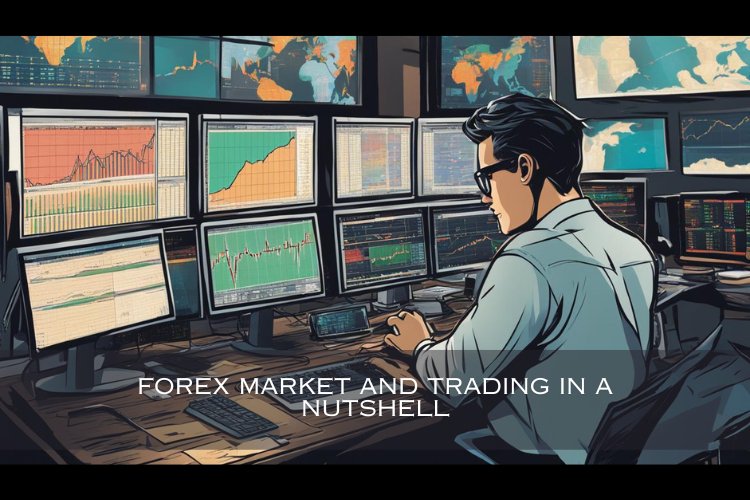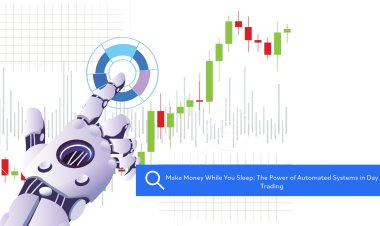Master the World of Forex Trading: A Guide for Every Level
Dive into forex trading with our comprehensive guide. Experts share tips and strategies for beginners and pros alike. Elevate your trading game today!

Master the World of Forex Trading: A Guide for Every Level
If you're interested in the world of forex trading, you're in the right place! This guide provides a comprehensive overview of forex trading, suitable for beginners and experienced traders alike.
Forex trading can be a lucrative way to earn money, but it can also be challenging, with many nuances and complexities to navigate. That's why we've put together this guide to help you understand the basics, learn about different strategies for success, and choose the best Forex broker for your needs.
Create an image of a person sitting in front of computer screens showing various charts and graphs related to forex trading. The person should be focused and serious in their expression, with their hands on the keyboard and mouse. The screens should be surrounded by other elements associated with forex trading, such as currency notes, calculators, pens, a notepad, and a world map. The lighting should be dim, and the background should be blurred to draw attention to the computer screens.
Key Takeaways:
- Forex trading can be a lucrative way to earn money, but it requires extensive knowledge and experience.
- This guide is suitable for beginners and experienced traders.
- Topics covered include Forex trading basics, strategies, Forex brokers, trading tools, and performance evaluation.
- Continuous learning is critical to success in forex trading.
- Choosing the right forex broker is essential to successful trading.
Understanding Forex Trading Basics
Forex trading, also known as currency trading or foreign exchange, is the buying and selling of currencies in the global market. This market is the largest and most liquid in the world, with an average daily trading volume of over $5 trillion. Understanding the basics of forex is crucial for anyone looking to enter this exciting market.
At its core, forex trading involves the buying of one currency and selling of another simultaneously. This is because currencies are always traded in pairs. The first currency in the pair is called the base currency, while the second currency is called the quote currency. The exchange rate between the two currencies determines how much of the quoted currency is needed to purchase one unit of the base currency.
Interest rates, current economic and political events, and trends in the global market are just a few of the variables that affect currency exchange rates. These fluctuations make the Forex market incredibly dynamic and provide profitable trading opportunities for those who can accurately predict and react to changes.
Key Terminology Used in Forex Trading
Before diving deeper into forex trading, it's important to understand some of the key terminology used in the market. Here are some essential terms:
- Pip: A pip is the smallest increment in which a currency pair can move. It stands for "percentage in points."
- Spread: The spread is the difference between the bid and ask price of a currency pair. It is a representation of the cost of trading and depends on the pair's liquidity.
- Leverage: Leverage allows traders to control larger positions in the market with a smaller initial investment. However, it also amplifies potential losses.
- Margins: Margins are the deposits required to open a trading position. They are also known as collateral.
Forex Trading Hours
The Forex market is open 24 hours a day, five days a week. The market opens on Sunday evening and closes on Friday evening, all in Eastern Standard Time (EST). However, trading is not constant throughout the day. The market is most active during overlapping trading sessions, such as when the New York and London sessions are open simultaneously.
|
Session |
Open (EST) |
Close (EST) |
|
Sydney |
5:00 pm |
2:00 am |
|
Tokyo |
7:00 pm |
4:00 am |
|
London |
3:00 am |
12:00 pm |
|
New York |
8:00 am |
5:00 pm |
Understanding the basics of forex trading is essential for anyone looking to succeed in this fast-paced market. Armed with this knowledge, traders can make informed decisions and navigate the market with confidence.
Getting Started with Online Forex Trading
If you're interested in forex trading, the first step is to find a reliable online broker to execute your trades. With so many options available, it's important to do your research and choose a broker that fits your specific needs. Consider factors such as regulation, account types, fees, and available educational resources.
Choosing a Forex Broker
Regulation is one of the most critical factors to consider when choosing a forex broker. A reputable broker should be registered with a regulatory body, such as the National Futures Association (NFA) in the US, the Financial Conduct Authority (FCA) in the UK, the Australian Securities and Investments Commission (ASIC) in Australia, or the IFMRRC of the Russian Federation.
The type of account the broker offers is another important factor. Many brokers provide different account types to cater to a range of traders, from beginners to advanced. Take time to research the various options and choose an account that aligns with your trading goals and experience level.
Fees are also a significant factor when selecting a forex broker. Brokers can charge fees in various ways, including spreads, commissions, and account maintenance fees. Make sure you understand the fee structure before opening an account to avoid any surprises down the line.
Last but not least, look for a forex broker that offers educational resources and support. Many brokers provide access to trading platforms, market updates, and trading tools. Some even offer educational resources such as webinars, courses, and tutorials to help new traders get started.
Understanding Forex Trading Platforms
Forex trading platforms are software programmes that allow traders to buy and sell currencies online. When choosing a broker, it's essential to consider the trading platform they offer. The platform should be intuitive, easy to use, and customizable to your trading needs.
Some of the most common Forex trading platforms include MetaTrader 4 and MetaTrader 5, cTrader, and TradingView. Each platform offers unique features, including charting tools, technical indicators, and automated trading options. Take the time to explore different platforms and find one that suits your trading style and preferences.
Opening a Forex Trading Account
Once you've chosen a broker and a trading platform, the next step is to open a trading account. The process typically involves filling out an online application and providing ID and proof of address documents. Most brokers require a minimum deposit to open an account, which can vary from a few hundred dollars to thousands of dollars.
Once your account is set up, you can fund it using a variety of payment methods, including bank transfers, credit cards, and e-wallets. The funds will appear in your account, and you can start trading right away.
In conclusion, getting started with online Forex trading requires careful consideration of the broker, trading platform, and account type. Take time to research your options, open a trading account, and start practicing with a demo account before risking real money. With a solid foundation and a bit of practice, you can become a successful Forex trader.
Essential Forex Trading Strategies
One of the keys to successful forex trading is having effective strategies in place. Traders can use different approaches to analyse market movements and make informed trading decisions. Here are some essential Forex trading strategies:
Technical Analysis
Technical analysis involves studying past market data, such as charts and price trends, to identify patterns and predict future price movements. Traders can use various tools, such as moving averages, trend lines, and oscillators, to help them analyse the market and make informed trading decisions. Technical analysis can be especially useful for short-term trading strategies.
Fundamental Analysis
Fundamental analysis involves analysing economic, financial, and other qualitative and quantitative factors that can impact a currency's value. Traders using this approach may analyse factors such as interest rates, GDP, and inflation, among others. By staying informed about market developments and analysing fundamental data, traders can make better-informed trading decisions.
Risk management techniques
Managing risk is a crucial part of any successful forex trading strategy. Traders can use different techniques to minimise risk, such as setting stop-loss orders, diversifying their portfolio, and following a disciplined trading plan. By managing risk effectively, traders can protect their capital and avoid significant losses.
Forex trading tips
Here are some Forex trading tips that can help traders develop profitable trading strategies:
- Start with a demo account to practice trading without risking real money.
- Develop a trading plan and stick to it.
- Set realistic trading goals and track your progress.
- Stay informed about market developments and news events that can impact currency prices.
- Take advantage of educational resources and trading tools provided by your broker, such as webinars, tutorials, and economic calendars.
Forex Analysis
Forex analysis involves using different techniques and tools to analyse market data and make trading decisions. By analysing market trends and staying informed about economic and political developments, traders can make better trading decisions. It's important to use a combination of technical and fundamental analysis to gain a comprehensive understanding of the market and develop effective trading strategies.
Choosing the Right Forex Broker
Choosing the right forex broker is crucial to success in the forex trading market. There are many factors to consider when selecting a broker, including regulations, account types, fees, and educational resources.
One important consideration is the trading platform offered by the broker. Look for a platform that is user-friendly and reliable, with a wide range of trading tools and features.
Regulation is also essential. A regulated broker is required to follow strict guidelines and ensure fair trading conditions for their clients.
Another consideration is the type of account offered by the broker. Most brokers offer a variety of account types, including demo accounts, micro accounts, and VIP accounts. Make sure to choose an account that suits your individual trading needs and experience level.
Forex trading platforms
Forex trading platforms are software programmes that allow traders to access the Forex market and execute trades. Choosing the right trading platform is essential for a successful trading experience.
Look for a platform that is user-friendly and intuitive, with a wide range of tools and features. A good trading platform will also offer customizable charts and indicators, as well as real-time news and economic data.
Forex Education
Forex education is an essential component of successful trading. Look for a broker that offers a wealth of educational resources, including webinars, courses, and tutorials. These resources can help you develop your trading skills and stay up-to-date on market trends and developments.
Additionally, many brokers offer demo accounts that allow you to practice trading strategies in a risk-free environment.
|
Broker |
Regulation |
Account Types |
Trading Platform |
Education |
|
Broker A |
Regulated by SEC and FCA |
Micro, Standard, VIP |
MT4, MT5 |
Webinars, Courses, Demo Account |
|
Broker B |
Regulated by ASIC |
Mini, Standard, ECN |
cTrader, MT4, MT5 |
Tutorials, Demo Account |
|
Broker C |
Regulated by IFMRRC |
Mini, Standard, Pro |
WebTrader, MT4, MT5 |
Webinars, Courses, Demo Account |
As shown in the table above, different brokers offer different features and services. Take the time to research and compare brokers to find one that meets your specific needs.
Maximising Profits with Forex Trading Tools
As a forex trader, having access to the right tools can make all the difference in your trading success. Here are some important Forex trading tools to consider:
Forex Charts
Forex charts are essential for analysing currency pairs and identifying trends. They allow traders to track price movements and make informed decisions based on technical analysis.
You can choose from a variety of Forex charting software, with popular options including MetaTrader, TradingView, and cTrader. These platforms offer advanced charting capabilities, including customizable indicators, timeframes, and chart types.
Forex trading indicators
Forex trading indicators are mathematical calculations that help traders identify market trends and potential trading opportunities. There are two main types of indicators: trend indicators and oscillators.
Examples of trend indicators include moving averages, Bollinger bands, and parabolic SAR, while examples of oscillators include the Relative Strength Index (RSI) and stochastic oscillator.
Forex trading robots
Forex trading robots, also known as expert advisors (EAs), are automated trading systems that can execute trades on your behalf. These programmes use predetermined rules and algorithms to enter and exit trades, allowing traders to take advantage of market opportunities 24/7.
While EAs can be helpful for streamlining your trading, it's important to note that they are not foolproof and require ongoing monitoring and adjustments.
Forex News and Economic Calendars
Staying up-to-date on the latest forex news and economic events is crucial for making informed trading decisions. Forex news sources can include financial news websites, social media, and Forex broker platforms.
Many traders also rely on economic calendars, which provide a schedule of upcoming news releases and economic data reports. These calendars can help traders identify potential market-moving events and adjust their trading strategies accordingly.
Pro Tip: When using Forex trading tools, it's important to choose options that align with your trading strategy and goals. Don't overload your trading platform with too many indicators or tools that you don't fully understand.
Mastering Forex Trading Psychology
Forex trading is not only about numbers and analysis; it is also about psychology. The way traders approach the market and think about trading can have a significant impact on their success. In this section, we will explore some key aspects of forex trading psychology and provide tips on how to develop the right mindset for success.
The Importance of Discipline
Discipline is essential for Forex traders. It helps them stick to their trading plan, manage risks, and avoid impulsive decision-making. One way to stay disciplined is to set clear goals and objectives. Traders should have a clear idea of what they want to achieve and how they plan to get there. They should also have a set of rules and guidelines that they follow consistently.
"Discipline is the bridge between goals and accomplishment." Jim Rohn
Managing Emotions
Emotions can be a trader's best friend or worst enemy. When emotions like fear, greed, or panic take over, traders can make irrational decisions that can lead to significant losses. It is essential to manage emotions and maintain a clear head while trading. One way to do this is to have a positive attitude and a healthy mindset. Traders should also practice stress-reducing techniques like meditation or exercise.
Handling Losses
Losses are an inevitable part of forex trading. No trader wins all the time. However, how traders handle losses can make a significant difference in their long-term success. Traders should learn to accept losses as part of the game and avoid chasing losses by taking unnecessary risks. They should also review their trades regularly, learn from their mistakes, and adjust their strategies accordingly.
The role of confidence
Confidence is an important trait for Forex traders. It helps them take calculated risks and make informed decisions. However, overconfidence can also be dangerous. Traders should strike a balance between confidence and humility. They should believe in their abilities but also be open to feedback and willing to learn from others.
Conclusion
Forex trading psychology is a critical aspect of successful trading. Traders who can manage their emotions, stay disciplined, and maintain confidence have a better chance of achieving their goals. By following the tips and strategies outlined in this section, traders can develop the right mindset to succeed in the forex market.
Advanced Forex Trading Strategies
For experienced traders looking to take their Forex trading game to the next level, there are several advanced strategies worth exploring. These techniques can provide traders with an edge in the market, allowing them to make more informed trading decisions and maximise profits.
Breakout Trading
Breakout trading is a popular strategy among advanced traders that involves identifying key levels of support and resistance and entering trades when the price breaks through these levels. Traders can use technical indicators such as moving averages, Bollinger bands, or the Relative Strength Index (RSI) to identify potential breakouts.
When trading breakouts, it's important to use stop-loss orders to limit potential losses since breakouts can sometimes be false signals. Traders should also consider the size of their position relative to their account balance and risk tolerance.
Trend Following
Trend following is another popular Forex trading strategy that involves identifying and following trends in the market. Traders can use technical indicators such as moving averages or the Ichimoku Kinko Hyo to identify trends and enter trades in the direction of the trend.
Traders should be cautious when trading against the trend, as this can lead to significant losses if the market moves against their position. It's important to use stop-loss orders to limit potential losses and to monitor the market closely for signs of a trend reversal.
Using Trading Signals
Trading signals are alerts generated by technical indicators or other trading tools that provide traders with information on potential trading opportunities. Traders can use trading signals to identify trends, generate entry and exit points, and make more informed trading decisions.
There are many different types of trading signals available, including those generated by moving average convergence divergence (MACD), relative strength index (RSI), or stochastic oscillator. Traders should carefully evaluate trading signals and consider their own analysis before entering trades based solely on a signal.
By incorporating advanced trading strategies into their Forex trading approach, experienced traders can enhance their skills and potentially increase their profitability. However, it's important to remember that these strategies involve a higher level of risk and should only be used by traders who understand the risks involved and have a solid understanding of the Forex market.
Expanding Your Forex Trading Education
Forex trading education is a crucial aspect of success for traders of all levels. It is important to continuously learn and stay up-to-date with the latest trends and strategies in the forex market. To expand your knowledge, consider enrolling in a reputable forex trading course.
There are many Forex trading courses available online, but it can be difficult to choose the right one. Look for courses that are taught by experienced traders and offer comprehensive material on technical analysis, fundamental analysis, risk management, and trading psychology.
You can also expand your education by attending forex trading seminars and conferences. These events provide opportunities to learn from industry experts and network with other traders.
Recommended Forex Trading Courses
|
Course Name |
Description |
Price |
|
Forex Trading A-Z™ - With LIVE Examples of Forex Trading |
This course covers everything from the basics to advanced trading strategies, with practical examples and case studies. |
$149.99 |
|
The Complete Foundation FOREX Trading Course |
This course focuses on technical analysis and how to implement trading strategies based on price action and chart patterns. |
$199.99 |
|
The Advanced Forex Course for Smart Traders |
This course teaches advanced trading strategies, including breakout trading and trend following, as well as risk management techniques. |
$399.99 |
Remember, investing in your education is a wise decision that can pay off in the long run. By expanding your knowledge, you can make more informed trading decisions and ultimately improve your chances of success in the Forex market.
Evaluating forex trading performance
Evaluating your Forex trading performance is a crucial step towards achieving success in the Forex markets. Regularly assessing your performance metrics and analysing your trades can provide valuable insights into your strengths and weaknesses as a trader.
|
Performance Metric |
What it Indicates |
|
Win rate |
The percentage of winning trades out of total trades executed. This indicates the accuracy of your trades. |
|
Profit factor |
The ratio of your total profit to your total losses. This indicates the profitability of your overall trading strategy. |
|
Drawdown |
The percentage of your account balance lost during a losing streak. This indicates your risk tolerance and the effectiveness of your risk management strategy. |
Tracking these performance metrics over time can help you identify patterns and areas for improvement. Analysing your trades can also help you identify which strategies are working and which ones need to be adjusted or abandoned.
Utilising the services of a reputable forex broker can also aid in evaluating your trading performance. Many brokers offer detailed trade analysis tools and reports that can provide additional insights into your trading activity.
Remember, evaluating your forex trading performance requires discipline and objectivity. Don't let emotions or biases cloud your judgement. Instead, focus on using data to make informed decisions and continuously improve your trading skills.
Conclusion
Congratulations on completing this comprehensive guide to forex trading! By now, you should have a solid understanding of the foundational concepts of forex trading, as well as advanced strategies and tools to enhance your trading performance.
Remember, the key to success in forex trading is continuous learning and practice. Apply the tips and techniques learned in this guide to your trading activities and evaluate your performance regularly to make data-driven decisions.
Don't forget to choose a reliable Forex broker, use helpful trading tools, and develop a winning trading mindset. By following these steps and staying up-to-date on market news and trends, you can maximise your profits in the exciting world of Forex trading.
FAQ
Is Forex trading suitable for beginners?
Yes, this guide is designed to provide information for beginners as well as experienced traders. It covers the basics of forex trading and gradually introduces more advanced concepts.
What is forex trading?
Forex trading, also known as foreign exchange trading, is the buying and selling of currencies on the global market. Traders aim to profit from fluctuations in exchange rates between different currencies.
What influences exchange rates?
Exchange rates are influenced by various factors, including economic indicators, geopolitical events, interest rates, and market sentiment. Understanding these influences is crucial for successful forex trading.
How do I choose a reliable forex broker?
When choosing a forex broker, consider factors such as regulation, reputation, trading platforms offered, customer support, and account types. It's important to select a broker that meets your specific trading needs.
What are some popular Forex trading strategies?
Popular Forex trading strategies include technical analysis, where traders analyse charts and patterns to make trading decisions, and fundamental analysis, where traders assess economic and political news to predict currency movements.
How can I manage my emotions while trading Forex?
Managing emotions is crucial in forex trading. Some techniques include setting realistic expectations, using proper risk management, taking breaks when needed, and continuously developing your trading psychology.
Are there any advanced forex trading strategies?
Yes, advanced traders can explore strategies such as breakout trading, trend following, and using trading signals. These strategies require more experience and knowledge of the Forex market.
Where can I find reputable forex trading courses?
There are various reputable forex trading courses available online. Consider platforms that offer comprehensive educational resources, practical examples, and reputable instructors to enhance your trading skills.
How can I evaluate my forex trading performance?
Evaluating performance involves tracking metrics such as win rate, risk-reward ratio, and overall profitability. Analysing past trades and seeking feedback from a forex broker can help you make data-driven decisions.
TradeFxP Features
If you choose to be a self-employed retail trader, here are a few things we offer:
- The best trading platform
- No Requotes
- Lowest Spreads
- High-level liquidity
- Interbank connectivity
- Pure STP/DMA/ECN
- Free signals
- Best support
- Crypto Wallet and withdrawals / Deposits (USDT)
- Robust CRM
- TradeFxP wallet
- Once click withdrawal
- Multiple payment options
- Local offices to walk in
- Free VPS
- Free Video Chat / Virtual Meetings
- And many more…
If you choose to be a part of our managed account programme,
- All of the above +
- 1-2% Daily Profits
- High-level risk management
- Capital protection
- Only 30% of the capital used
- Negative balance protection
- Our fee is from the profits only
- Monthly profit withdrawal
- Wallet system – Use it like Phonepe, or Google Pay
- Crypto wallet and withdrawals / Deposits (USDT)
- Live monitoring
- MyFxbook Live monitoring
- Copy Trading
- And many more…
Optional: If you do not withdraw your profits for 2 months, our system will use those profits to trade and will keep your 100% capital safe and secure for margin purposes. This is optional, and if you choose not to be a part of it, you can withdraw your profits from the first month itself.
Why 1-2% daily? Can't your managed forex account earn more?
Yes, we can! Remember: greed may be good in the beginning, but in the end, it will destroy everything. You and I know that! Many droplets make an ocean! Join the Managed Account Programme and sit back for six months, then look at your account. You'll see that our strategy is good and the best. Do you know what I mean?
If you choose to be a part of us as an introducing broker (IB) or channel partner,
- Industry-best rebates
- Local Office support
- Staff support
- Marketing support
- Marketing materials
- And many more…
Having said that,
You can join our Forex Managed Account programme and earn 1-2% profits daily. See for yourself by clicking the below link.
Have a great journey, and may you catch some big waves on your way to prosperity!
To see Ai Forex Trading for real, use these credentials.
- Low-risk strategy:
- Mt4: 112018
- Pw: Allah@101
- Server: TradeFxP live,
1. To read why you should be with us, click here.
2. To open an account, click here.
3. To see our regulation certificate, click here.
4. To see our news with the IFMRRC, click here.
5. For claims, click here.
6. For the main site, click here.
7. For blogs and articles, click here.
8. Main Website: www.TradeFxP.com



 admin
admin 










